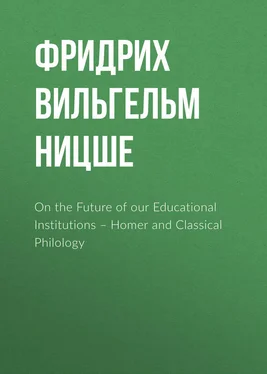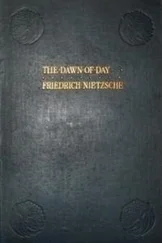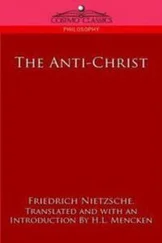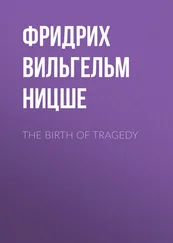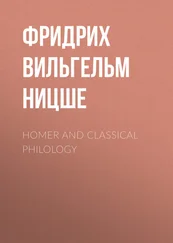Фридрих Ницше - On the Future of our Educational Institutions – Homer and Classical Philology
Здесь есть возможность читать онлайн «Фридрих Ницше - On the Future of our Educational Institutions – Homer and Classical Philology» — ознакомительный отрывок электронной книги совершенно бесплатно, а после прочтения отрывка купить полную версию. В некоторых случаях можно слушать аудио, скачать через торрент в формате fb2 и присутствует краткое содержание. Жанр: Философия, literature_19, foreign_antique, foreign_prose, на английском языке. Описание произведения, (предисловие) а так же отзывы посетителей доступны на портале библиотеки ЛибКат.
- Название:On the Future of our Educational Institutions – Homer and Classical Philology
- Автор:
- Жанр:
- Год:неизвестен
- ISBN:нет данных
- Рейтинг книги:5 / 5. Голосов: 1
-
Избранное:Добавить в избранное
- Отзывы:
-
Ваша оценка:
- 100
- 1
- 2
- 3
- 4
- 5
On the Future of our Educational Institutions – Homer and Classical Philology: краткое содержание, описание и аннотация
Предлагаем к чтению аннотацию, описание, краткое содержание или предисловие (зависит от того, что написал сам автор книги «On the Future of our Educational Institutions – Homer and Classical Philology»). Если вы не нашли необходимую информацию о книге — напишите в комментариях, мы постараемся отыскать её.
On the Future of our Educational Institutions – Homer and Classical Philology — читать онлайн ознакомительный отрывок
Ниже представлен текст книги, разбитый по страницам. Система сохранения места последней прочитанной страницы, позволяет с удобством читать онлайн бесплатно книгу «On the Future of our Educational Institutions – Homer and Classical Philology», без необходимости каждый раз заново искать на чём Вы остановились. Поставьте закладку, и сможете в любой момент перейти на страницу, на которой закончили чтение.
Интервал:
Закладка:
The third and most important stipulation is, that he should in no case be constantly bringing himself and his own "culture" forward, after the style of most modern men, as the correct standard and measure of all things. We would have him so highly educated that he could even think meanly of his education or despise it altogether. Only thus would he be able to trust entirely to the author's guidance; for it is only by virtue of ignorance and his consciousness of ignorance, that the latter can dare to make himself heard. Finally, the author would wish his reader to be fully alive to the specific character of our present barbarism and of that which distinguishes us, as the barbarians of the nineteenth century, from other barbarians.
Now, with this book in his hand, the writer seeks all those who may happen to be wandering, hither and thither, impelled by feelings similar to his own. Allow yourselves to be discovered – ye lonely ones in whose existence I believe! Ye unselfish ones, suffering in yourselves from the corruption of the German spirit! Ye contemplative ones who cannot, with hasty glances, turn your eyes swiftly from one surface to another! Ye lofty thinkers, of whom Aristotle said that ye wander through life vacillating and inactive so long as no great honour or glorious Cause calleth you to deeds! It is you I summon! Refrain this once from seeking refuge in your lairs of solitude and dark misgivings. Bethink you that this book was framed to be your herald. When ye shall go forth to battle in your full panoply, who among you will not rejoice in looking back upon the herald who rallied you?
INTRODUCTION
The title I gave to these lectures ought, like all titles, to have been as definite, as plain, and as significant as possible; now, however, I observe that owing to a certain excess of precision, in its present form it is too short and consequently misleading. My first duty therefore will be to explain the title, together with the object of these lectures, to you, and to apologise for being obliged to do this. When I promised to speak to you concerning the future of our educational institutions, I was not thinking especially of the evolution of our particular institutions in Bâle. However frequently my general observations may seem to bear particular application to our own conditions here, I personally have no desire to draw these inferences, and do not wish to be held responsible if they should be drawn, for the simple reason that I consider myself still far too much an inexperienced stranger among you, and much too superficially acquainted with your methods, to pretend to pass judgment upon any such special order of scholastic establishments, or to predict the probable course their development will follow. On the other hand, I know full well under what distinguished auspices I have to deliver these lectures – namely, in a city which is striving to educate and enlighten its inhabitants on a scale so magnificently out of proportion to its size, that it must put all larger cities to shame. This being so, I presume I am justified in assuming that in a quarter where so much is done for the things of which I wish to speak, people must also think a good deal about them. My desire – yea, my very first condition, therefore, would be to become united in spirit with those who have not only thought very deeply upon educational problems, but have also the will to promote what they think to be right by all the means in their power. And, in view of the difficulties of my task and the limited time at my disposal, to such listeners, alone, in my audience, shall I be able to make myself understood – and even then, it will be on condition that they shall guess what I can do no more than suggest, that they shall supply what I am compelled to omit; in brief, that they shall need but to be reminded and not to be taught. Thus, while I disclaim all desire of being taken for an uninvited adviser on questions relating to the schools and the University of Bâle, I repudiate even more emphatically still the rôle of a prophet standing on the horizon of civilisation and pretending to predict the future of education and of scholastic organisation. I can no more project my vision through such vast periods of time than I can rely upon its accuracy when it is brought too close to an object under examination. With my title: Our Educational Institutions, I wish to refer neither to the establishments in Bâle nor to the incalculably vast number of other scholastic institutions which exist throughout the nations of the world to-day; but I wish to refer to German institutions of the kind which we rejoice in here. It is their future that will now engage our attention, i. e. the future of German elementary, secondary, and public schools (Gymnasien) and universities. While pursuing our discussion, however, we shall for once avoid all comparisons and valuations, and guard more especially against that flattering illusion that our conditions should be regarded as the standard for all others and as surpassing them. Let it suffice that they are our institutions, that they have not become a part of ourselves by mere accident, and were not laid upon us like a garment; but that they are living monuments of important steps in the progress of civilisation, in some respects even the furniture of a bygone age, and as such link us with the past of our people, and are such a sacred and venerable legacy that I can only undertake to speak of the future of our educational institutions in the sense of their being a most probable approximation to the ideal spirit which gave them birth. I am, moreover, convinced that the numerous alterations which have been introduced into these institutions within recent years, with the view of bringing them up-to-date, are for the most part but distortions and aberrations of the originally sublime tendencies given to them at their foundation. And what we dare to hope from the future, in this behalf, partakes so much of the nature of a rejuvenation, a reviviscence, and a refining of the spirit of Germany that, as a result of this very process, our educational institutions may also be indirectly remoulded and born again, so as to appear at once old and new, whereas now they only profess to be "modern" or "up-to-date."
Now it is only in the spirit of the hope above mentioned that I wish to speak of the future of our educational institutions: and this is the second point in regard to which I must tender an apology from the outset. The "prophet" pose is such a presumptuous one that it seems almost ridiculous to deny that I have the intention of adopting it. No one should attempt to describe the future of our education, and the means and methods of instruction relating thereto, in a prophetic spirit, unless he can prove that the picture he draws already exists in germ to-day, and that all that is required is the extension and development of this embryo if the necessary modifications are to be produced in schools and other educational institutions. All I ask, is, like a Roman haruspex, to be allowed to steal glimpses of the future out of the very entrails of existing conditions, which, in this case, means no more than to hand the laurels of victory to any one of the many forces tending to make itself felt in our present educational system, despite the fact that the force in question may be neither a favourite, an esteemed, nor a very extensive one. I confidently assert that it will be victorious, however, because it has the strongest and mightiest of all allies in nature herself; and in this respect it were well did we not forget that scores of the very first principles of our modern educational methods are thoroughly artificial, and that the most fatal weaknesses of the present day are to be ascribed to this artificiality. He who feels in complete harmony with the present state of affairs and who acquiesces in it as something " selbstverständliches ," 1 1 Selbstverständlich = "granted or self-understood."
excites our envy neither in regard to his faith nor in regard to that egregious word " selbstverständlich ," so frequently heard in fashionable circles.
Интервал:
Закладка:
Похожие книги на «On the Future of our Educational Institutions – Homer and Classical Philology»
Представляем Вашему вниманию похожие книги на «On the Future of our Educational Institutions – Homer and Classical Philology» списком для выбора. Мы отобрали схожую по названию и смыслу литературу в надежде предоставить читателям больше вариантов отыскать новые, интересные, ещё непрочитанные произведения.
Обсуждение, отзывы о книге «On the Future of our Educational Institutions – Homer and Classical Philology» и просто собственные мнения читателей. Оставьте ваши комментарии, напишите, что Вы думаете о произведении, его смысле или главных героях. Укажите что конкретно понравилось, а что нет, и почему Вы так считаете.
